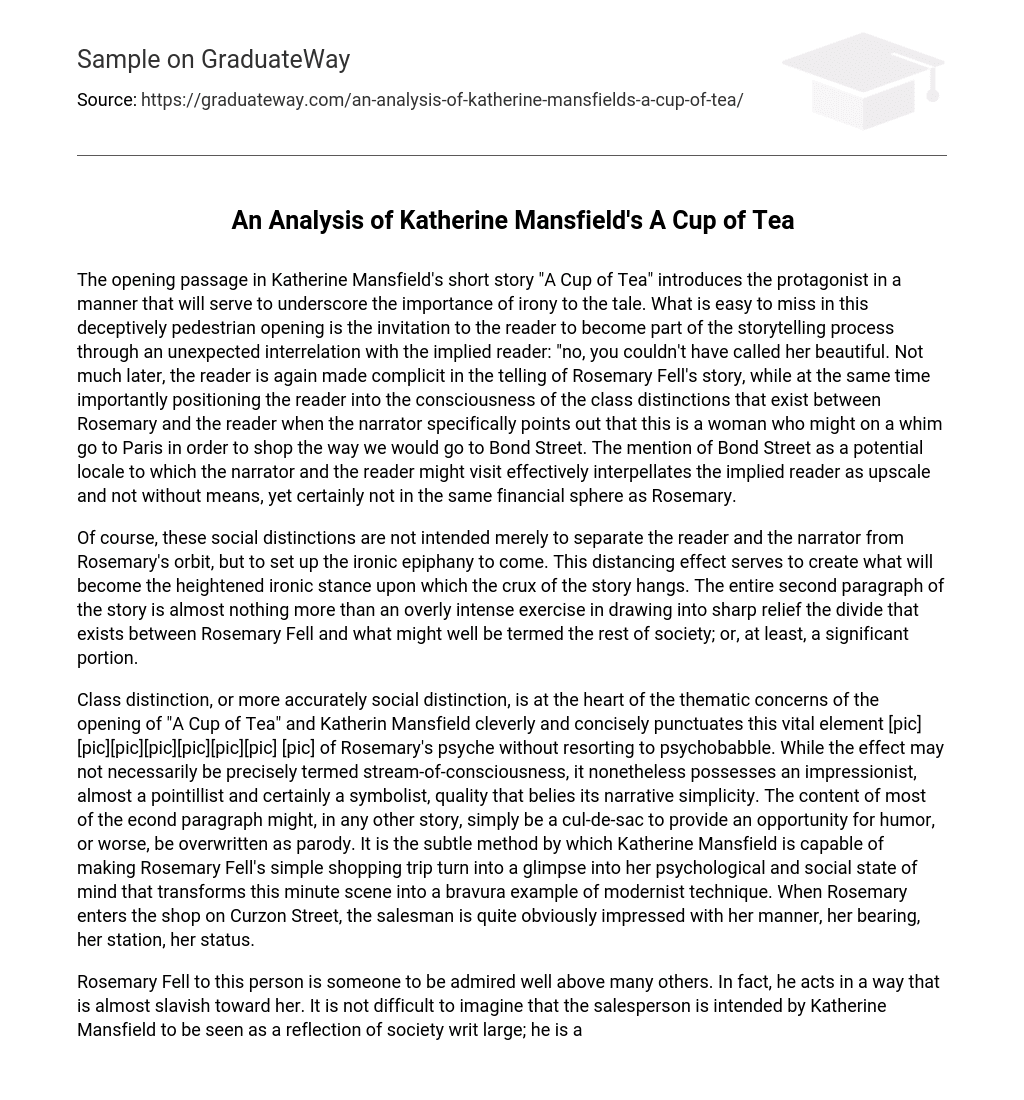The opening passage in Katherine Mansfield’s short story “A Cup of Tea” introduces the protagonist in a manner that will serve to underscore the importance of irony to the tale. What is easy to miss in this deceptively pedestrian opening is the invitation to the reader to become part of the storytelling process through an unexpected interrelation with the implied reader: “no, you couldn’t have called her beautiful. Not much later, the reader is again made complicit in the telling of Rosemary Fell’s story, while at the same time importantly positioning the reader into the consciousness of the class distinctions that exist between Rosemary and the reader when the narrator specifically points out that this is a woman who might on a whim go to Paris in order to shop the way we would go to Bond Street. The mention of Bond Street as a potential locale to which the narrator and the reader might visit effectively interpellates the implied reader as upscale and not without means, yet certainly not in the same financial sphere as Rosemary.
Of course, these social distinctions are not intended merely to separate the reader and the narrator from Rosemary’s orbit, but to set up the ironic epiphany to come. This distancing effect serves to create what will become the heightened ironic stance upon which the crux of the story hangs. The entire second paragraph of the story is almost nothing more than an overly intense exercise in drawing into sharp relief the divide that exists between Rosemary Fell and what might well be termed the rest of society; or, at least, a significant portion.
Class distinction, or more accurately social distinction, is at the heart of the thematic concerns of the opening of “A Cup of Tea” and Katherin Mansfield cleverly and concisely punctuates this vital element [pic][pic][pic][pic][pic][pic][pic] [pic] of Rosemary’s psyche without resorting to psychobabble. While the effect may not necessarily be precisely termed stream-of-consciousness, it nonetheless possesses an impressionist, almost a pointillist and certainly a symbolist, quality that belies its narrative simplicity. The content of most of the econd paragraph might, in any other story, simply be a cul-de-sac to provide an opportunity for humor, or worse, be overwritten as parody. It is the subtle method by which Katherine Mansfield is capable of making Rosemary Fell’s simple shopping trip turn into a glimpse into her psychological and social state of mind that transforms this minute scene into a bravura example of modernist technique. When Rosemary enters the shop on Curzon Street, the salesman is quite obviously impressed with her manner, her bearing, her station, her status.
Rosemary Fell to this person is someone to be admired well above many others. In fact, he acts in a way that is almost slavish toward her. It is not difficult to imagine that the salesperson is intended by Katherine Mansfield to be seen as a reflection of society writ large; he is another of those subtly minute features invested with worldly meaning. His self-admitted love of things certainly can be read as a statement about the rising consumerist mentality of the post-industrial age in which the movement was distinctly away from ownership of what one made to ownership of what one bought.
The box that Rosemary admires and the salesperson would rather not allow to fall into the hands of the mindless rabble is a perfect symbol of this consumerist mentality as well as, of course, a foreshadowing of the young girl to which is extended the offer of tea. The box, like the girl, is pretty, but other than that it possesses little in the way of utilitarian necessity for Rosemary. That girl arrives at the end of this excerpt of “A Cup of Tea”, but already she can clearly be seen as something that Rosemary Fell needs to possess for purely selfish reasons.
It isn’t yet known, of course, what reason there might be for Rosemary to eventually invite the girl home, but the paragraph that precedes the girl’s entrance into the story is loaded with meaning. The point of view comes from inside Rosemary’s consciousness, though there is no first person evidence of this assumption. But there can be no doubt that the description of streetlights as sad and umbrellas as hateful is not coming from the narrative voice with which the story began. Rosemary has just stepped outside the door of the shop and it is easy to imagine that she feels far more comfortable inside shops looking out than outside shops ooking; Rosemary Fell has no need to be content with mere window shopping. That doorway represents a threshold of sorts and it is, in fact, the beginning of the dis-integration of her character. For the first time the reader is made to feel sympathy toward Rosemary. Sympathy-or empathy-is the first step in allowing one to view another human being without the trappings of that gossipy schadenfreude that marked the first two paragraphs. The process by which Rosemary will fall from her firm and assured grasp on Modernism to the hard landing in the face of old-fashioned Romanticism initiates with another irony.
At just the moment that Rosemary Fell intuits that the disturbing emotions she has been feeling since shutting that discreet door can best be dealt with by having a cup of tea and forgetting them, the young girl enter the story. Rosemary Fell will go home for that tea, but rather than being allowed to forget her temporary disillusionment and return to her happy acceptance of modernist esteem, she will be forced to confront the fact that creating yourself in the dressing of new versus old does not always guarantee that the old can be displaced.





